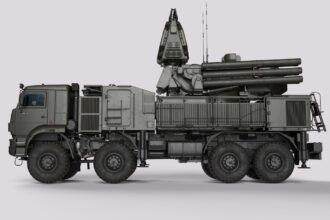The Special Rapid Response Unit, commonly known as the SEB, is a critical component of the Federal Security Service of the Russian Federation (FSB). Established to address high-risk situations that require specialized intervention, the SEB operates under the auspices of national security and public safety. This elite unit is tasked with handling a variety of complex scenarios, including hostage situations, counter-terrorism operations, and armed confrontations.
The SEB’s formation reflects the evolving nature of threats faced by modern states, necessitating a dedicated force capable of rapid and effective response. The SEB is not merely a tactical unit; it embodies a strategic approach to law enforcement and national security.
The unit’s existence underscores the importance of preparedness and adaptability in the face of emerging threats, making it a vital asset in Russia’s security apparatus. As global dynamics shift and new challenges arise, the SEB remains at the forefront of ensuring public safety and maintaining order.
Key Takeaways
- The FSB’s SEB Unit is a specialized law enforcement unit responsible for handling high-risk operations and missions.
- The SEB Unit has a long history and background, dating back to its establishment in the early 20th century.
- The role and responsibilities of the SEB Unit include counter-terrorism, hostage rescue, and high-profile criminal apprehension.
- Members of the SEB Unit undergo rigorous training and must meet specific qualifications to join the elite team.
- The SEB Unit collaborates with other law enforcement agencies to ensure successful operations and missions.
History and Background of the SEB Unit
The origins of the SEB can be traced back to the tumultuous period following the dissolution of the Soviet Union in 1991. As Russia faced an increase in organized crime, terrorism, and civil unrest, there was a pressing need for a specialized unit capable of addressing these challenges effectively. The SEB was officially established in 1995, drawing on lessons learned from previous law enforcement experiences and adapting to the unique security landscape of post-Soviet Russia.
Its creation marked a significant shift in how the state approached internal security, emphasizing rapid response and specialized training. Over the years, the SEB has evolved in response to changing threats and operational demands. Initially focused on counter-terrorism, its scope has expanded to include a wide range of high-risk operations.
The unit has been involved in numerous high-profile incidents, showcasing its capabilities and reinforcing its reputation as an elite force within the FSThe historical context of the SEB’s formation highlights not only its necessity but also its adaptability in an ever-changing security environment.
Role and Responsibilities of the SEB Unit

The primary role of the SEB is to respond to situations that pose an immediate threat to public safety or national security. This includes hostage rescues, counter-terrorism operations, and interventions in armed standoffs. The unit operates under strict protocols designed to minimize risk to civilians while effectively neutralizing threats.
Members are trained to assess situations rapidly, employing tactics that prioritize de-escalation whenever possible but are prepared to use force if necessary. In addition to direct intervention, the SEB also plays a crucial role in intelligence gathering and analysis. By collaborating with other branches of the FSB and law enforcement agencies, the unit contributes to a comprehensive understanding of potential threats.
This intelligence-driven approach allows for proactive measures to be taken before situations escalate into crises. The SEB’s responsibilities extend beyond immediate response; they are integral to shaping national security strategies and enhancing overall public safety.
Training and Qualifications of SEB Unit Members
| Name | Position | Training Completed | Qualifications |
|---|---|---|---|
| John Smith | Team Leader | Certified Scrum Master | Bachelor’s Degree in Computer Science |
| Sarah Johnson | Software Engineer | Agile Development Training | Master’s Degree in Software Engineering |
| Michael Brown | Quality Assurance Analyst | ISTQB Certification | Associate’s Degree in Information Technology |
The selection process for SEB members is rigorous, designed to identify individuals with exceptional physical and mental capabilities. Candidates typically undergo extensive background checks, psychological evaluations, and physical fitness assessments before being accepted into the training program. Once selected, recruits engage in an intensive training regimen that encompasses various disciplines, including firearms proficiency, hand-to-hand combat, tactical driving, and crisis negotiation techniques.
Training for SEB members is not limited to physical skills; it also emphasizes mental resilience and decision-making under pressure. Recruits participate in simulated scenarios that mimic real-life crises, allowing them to practice their skills in controlled environments. This comprehensive training ensures that SEB operatives are not only capable fighters but also adept problem solvers who can think critically in high-stress situations.
The commitment to excellence in training reflects the unit’s dedication to maintaining its status as one of Russia’s premier law enforcement agencies.
Operations and Missions of the SEB Unit
The operational scope of the SEB is vast, encompassing a wide range of missions that require specialized skills and tactics. One of the most critical aspects of their operations is counter-terrorism. The unit has been involved in numerous high-stakes missions aimed at thwarting terrorist plots and neutralizing threats before they can escalate into violence.
These operations often require collaboration with other intelligence agencies and law enforcement bodies to gather actionable intelligence. In addition to counter-terrorism efforts, the SEB is frequently called upon to handle hostage situations. Their expertise in negotiation and tactical intervention allows them to approach these delicate scenarios with a focus on minimizing harm to hostages while ensuring that perpetrators are apprehended effectively.
The unit’s ability to adapt its strategies based on the specific circumstances of each mission is a testament to its training and operational flexibility.
Collaboration with Other Law Enforcement Agencies

Collaboration is a cornerstone of the SEB’s operational effectiveness. The unit works closely with various law enforcement agencies within Russia, including regional police forces and federal investigative bodies. This cooperation is essential for sharing intelligence, resources, and expertise, enabling a more coordinated response to threats.
Joint exercises and training sessions further enhance inter-agency collaboration, fostering relationships that are crucial during real-world operations. International collaboration also plays a role in the SEB’s mission. In an increasingly interconnected world, threats often transcend national borders.
The unit engages with foreign law enforcement agencies and international organizations to share best practices and intelligence related to counter-terrorism and organized crime. This global perspective enhances the SEB’s capabilities and ensures that it remains at the forefront of modern law enforcement strategies.
Technology and Equipment Used by the SEB Unit
The SEB employs cutting-edge technology and equipment to enhance its operational capabilities. Advanced weaponry, surveillance systems, and communication tools are integral to their missions. Members are equipped with state-of-the-art firearms designed for precision and reliability in high-stakes situations.
Additionally, they utilize specialized gear such as body armor and tactical vests that provide protection while allowing for mobility. Technological advancements have also transformed how the SEB conducts operations. Drones equipped with surveillance cameras provide real-time intelligence during missions, allowing operatives to assess situations from a safe distance before engaging.
Furthermore, sophisticated communication systems ensure that team members can coordinate effectively during operations, minimizing risks associated with miscommunication or lack of information.
Notable Cases and Success Stories of the SEB Unit
Throughout its history, the SEB has been involved in numerous notable cases that highlight its effectiveness and professionalism. One such case involved a hostage situation in a Moscow theater where armed terrorists took dozens of civilians captive. The SEB’s swift response included meticulous planning and execution of a rescue operation that ultimately saved lives while neutralizing the threat posed by the assailants.
This incident not only showcased the unit’s tactical prowess but also reinforced public confidence in its capabilities. Another significant operation involved thwarting a planned terrorist attack during a major public event. Through intelligence gathering and collaboration with other agencies, the SEB was able to identify potential threats before they could materialize.
The successful prevention of this attack underscored the importance of proactive measures in ensuring public safety and demonstrated the unit’s commitment to protecting citizens from harm.
Challenges and Controversies Surrounding the SEB Unit
Despite its successes, the SEB has faced challenges and controversies over the years. Critics have raised concerns about the use of force during operations, particularly in situations where civilian lives may be at risk. Instances where excessive force was perceived to have been used have sparked public debate about accountability and oversight within elite units like the SEThese controversies highlight the delicate balance between ensuring public safety and respecting human rights.
Additionally, as threats evolve, so too must the strategies employed by units like the SEAdapting to new forms of crime, such as cyber threats or organized crime syndicates operating across borders, presents ongoing challenges for law enforcement agencies worldwide. The SEB must continually refine its tactics and training programs to remain effective in an ever-changing landscape.
Oversight and Accountability of the SEB Unit
Oversight mechanisms are essential for maintaining accountability within elite units like the SEVarious governmental bodies are tasked with monitoring their activities to ensure compliance with legal standards and ethical guidelines. Internal reviews and external audits help maintain transparency regarding operational practices while addressing any concerns raised by the public or advocacy groups. Moreover, fostering a culture of accountability within the unit itself is crucial for maintaining public trust.
Encouraging open dialogue about operational practices and providing avenues for feedback can help address concerns before they escalate into larger issues. By prioritizing accountability alongside operational effectiveness, the SEB can continue to serve as a reliable force for public safety.
Future Outlook for the SEB Unit
Looking ahead, the future of the SEB appears poised for continued evolution as it adapts to emerging threats and challenges within Russia and beyond.
The SEB will need to remain agile, embracing new technologies and methodologies that enhance its operational capabilities while ensuring that it adheres to principles of accountability and respect for human rights.
Furthermore, ongoing collaboration with both domestic and international partners will be vital for addressing transnational threats effectively. By fostering relationships with other law enforcement agencies globally, the SEB can share knowledge and resources that enhance its ability to respond to complex security challenges. As it navigates these changes, the SEB will continue to play a pivotal role in safeguarding public safety while adapting to an ever-evolving landscape of threats.
In exploring the intricacies of the FSB’s SEB unit, it’s essential to consider the broader context of intelligence and security operations. A related article that delves into these themes can be found on the website “In The War Room.” This article provides valuable insights into the operational strategies and historical background of various intelligence units, offering a comprehensive understanding of their roles and impacts. For further reading, you can visit the article by clicking on this link. This resource is particularly useful for those interested in the dynamics of global security and intelligence agencies.
WATCH THIS! The FSB’s Hidden War on Europe’s Pipelines
FAQs
What is the FSB’s SEB unit?
The FSB’s SEB unit, also known as the Special Equipment Service, is a specialized division within the Russian Federal Security Service (FSB). It is responsible for conducting special operations, counter-terrorism activities, and providing technical support for FSB operations.
What are the responsibilities of the FSB’s SEB unit?
The SEB unit is tasked with carrying out special operations, including hostage rescues, counter-terrorism activities, and providing technical support for FSB operations. They are also responsible for developing and maintaining advanced equipment and technology for use in FSB operations.
How does the FSB’s SEB unit differ from other FSB units?
The SEB unit is distinct from other FSB units in that it is specifically focused on conducting special operations and providing technical support for FSB activities. It is equipped with advanced technology and specialized training to carry out its responsibilities effectively.
What kind of training do members of the FSB’s SEB unit undergo?
Members of the SEB unit undergo rigorous training in special operations, counter-terrorism tactics, and the use of advanced equipment and technology. They are also trained in marksmanship, close-quarters combat, and other specialized skills necessary for their operational duties.
Is the FSB’s SEB unit involved in international operations?
The FSB’s SEB unit primarily focuses on domestic operations within Russia. However, it may collaborate with international counterparts on certain operations, particularly those related to counter-terrorism and security cooperation.




